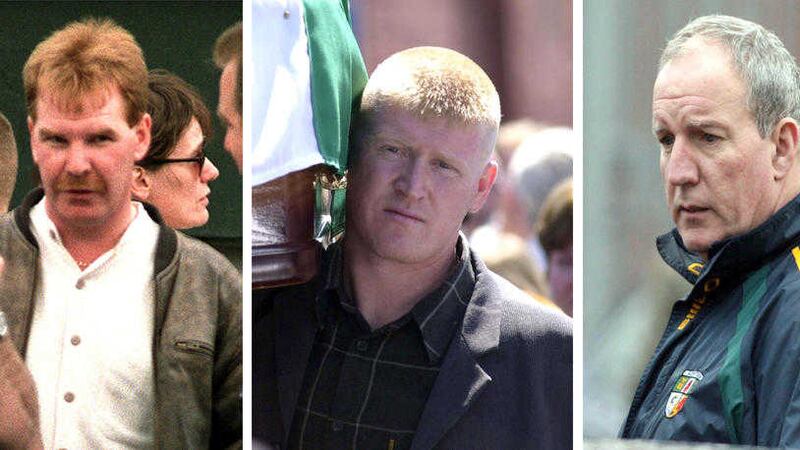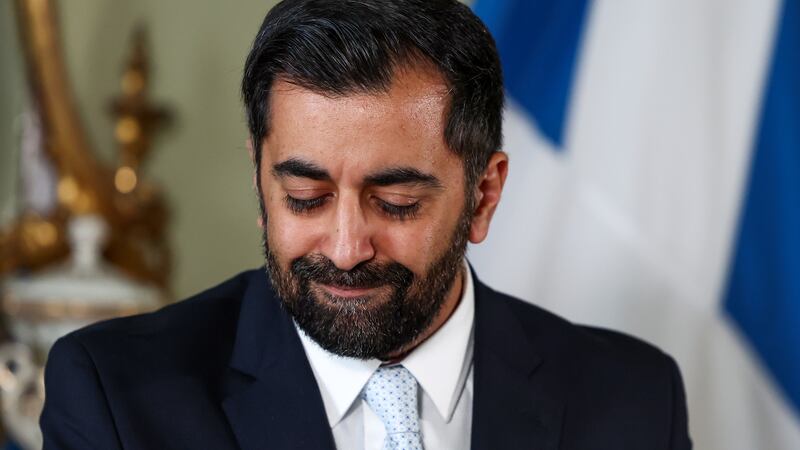The three republicans arrested over the Kevin McGuigan murder
BOBBY Storey, a former IRA prisoner, is a core member of the Sinn Féin leadership and the party's northern chairman.
In 2005, Ulster Unionist Party (UUP) MP David Burnside told the House of Commons under parliamentary privilege that Mr Storey was the head of intelligence for the IRA.
The 59-year-old from Andersonstown was a senior member of the IRA and in recent years has taken on the role of Sinn Féin's northern chairman, a job that comes with an office at Stormont.
He joined the IRA at 16 and was interned on his 17th birthday, spending the next two years alongside many leading republicans in what was then called Long Kesh.
He spent up to 20 years in jail over the course of Troubles, much of it on remand, and took part in the IRA's mass breakout from the Maze prison in 1983 before being recaptured.
Seen as a close associate and ally of Gerry Adams, Storey reportedly policed the IRA ceasefire in the 1990s and is still seen acting as a steward during demonstrations against loyalist parades on the Crumlin Road.
In the post-ceasefire period he has been arrested in relation to the Castlereagh break-in, the Northern Bank robbery and the disappearance of Jean McConville in 1972.
Last year during at a protest against Gerry Adams's arrest, Storey paraphrased the Sinn Féin president's famous phrase from 1995, telling the assembled crowd "We ain't gone away you know", though it wasn't explicit who he was referring to.
In May this year he carried the coffin of former IRA commander Gerard 'Jock' Davison alongside fellow leading republican Sean 'Spike' Murray.
EDDIE 'Bubbles' Copeland is a well-known republican figure from the Ardoyne area of north Belfast.
Copeland (45) joined the IRA in the 1980s. He came to public prominence in 1993 when he was shot by a British soldier as he gathered with mourners outside the home of Shankill bomber Thomas Begley.
A British army private was later sentenced to ten years in prison for attempted murder, while Copeland was awarded £27,500 compensation.
In 1996, after the breakdown of the IRA's first ceasefire, Copeland was seriously injured in a UDA car bomb attack outside his home. He later received £60,000 in compensation for his injuries.
In 2001 Copeland was refused bail as he faced accusations of kidnapping, false imprisonment, assault and threatening to kill another person. The alleged victim was Patrick Shannon, a known drug dealer, who had been abducted from an Ardoyne bookies two days earlier.
Mr Shannon had contacted the RUC and indicated that he wished to withdraw his statement in which he allegedly named Copeland. Shannon's lawyer told the court that his client's family, including his 70-year-old mother, had been threatened and instructed that the charges must be withdrawn.
According to a republican source, Copeland is regarded as an "old school soldier" rather than a Sinn Féin loyalist. He was among the first on the scene when Jock Davison was shot dead in the Markets area of Belfast in May.
BRIAN 'Gillie' Gillen (58) is a former officer commanding in Belfast who was identified by Peter Robinson under parliamentary privilege in 2001 as a member of the IRA's army council.
Raised in the lower Falls and a long-time republican activist, Gillen was a client of Pat Finucane when the solicitor was murdered in 1989.
Gillen was cast as a 'hawk' in the years after the IRA ceasefire but was persuaded to stay loyal to the leadership even though he was not entirely enamoured with Sinn Féin's strategy. Like Copeland, his active role in the republican movement diminished in the aftermath of Seana Walsh's 2005 statement signalling an end to the IRA's armed campaign.
In 2000, Gillen, along with Gerry Adams, Martin McGuinness, Pat Doherty and Brian Keenan was issued with a subpoena, in order to appear at the High Court as part of a civil action which was taken by relatives of the 29 Omagh bomb victims.








